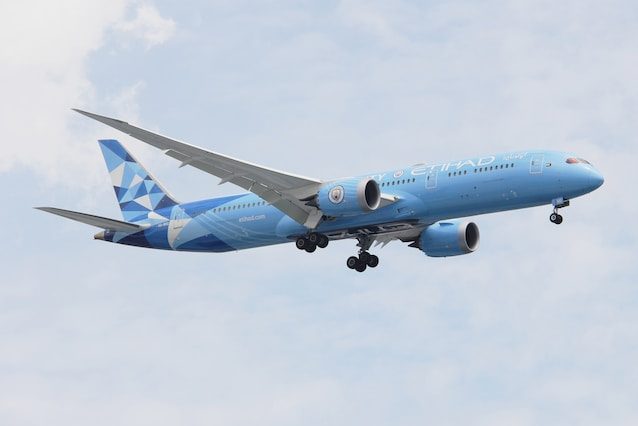Before we dive deep into the PESTEL analysis, let’s get the business overview of Etihad Airways. Etihad Airways is the flag carrier and the second-largest airline in the United Arab Emirates, after Emirates. Established in 2003, the airline is headquartered in Abu Dhabi, the UAE’s capital.
- Global Presence: Etihad has grown significantly since its establishment, serving multiple destinations across Asia, Europe, North America, Africa, Australia, and the Middle East.
- Fleet Size: Etihad operates a diverse fleet of aircraft, including Airbus and Boeing, offering a mix of wide-body and narrow-body planes that suit long-haul and regional flights.
- Business Strategy: While initially adopting an aggressive acquisition and investment strategy, wherein it took stakes in several global airlines (known as the equity alliance strategy), Etihad faced challenges with this approach due to the financial struggles of some of its investment partners. The airline has shifted its focus to sustainability, efficiency, and optimizing operations in recent years.
- Subsidiaries and Partnerships: The Etihad Aviation Group has several subsidiaries, including Etihad Holidays, Etihad Cargo, and a loyalty program called Etihad Guest. Moreover, the airline has codeshare agreements with numerous international carriers, expanding its reach without adding routes.
- Premium Services: Etihad is renowned for its luxury services, especially in its Business and First-Class sections. The airline’s “The Residence” service on its A380 fleet offers a three-room suite, including a living room, bedroom, and private bathroom—a first in the airline industry.
- Hub: Etihad operates out of Abu Dhabi International Airport, using it as a primary hub to connect flights from the West to the East and vice versa.
- Financial & Operational Performance: In H1 of 2022, Etihad generated a revenue of US$ 1.25 billion (H1 2021: US$ 320 million) and a record-breaking core operating profit of US$ 296 million (H1 2021: US$ 392 million loss). Etihad carried 4.02 million passengers in H1 2022, over 3 million more than last year (H1 2021: 980,000), with an average seat load factor of 75%.
Here is the PESTEL analysis of Etihad Airways
A PESTEL analysis is a strategic management framework used to examine the external macro-environmental factors that can impact an organization or industry. The acronym PESTEL stands for:
- Political factors: Relate to government policies, regulations, political stability, and other political forces that may impact the business environment.
- Economic factors: Deal with economic conditions and trends affecting an organization’s operations, profitability, and growth.
- Sociocultural factors: Relate to social and cultural aspects that may influence consumer preferences, lifestyles, demographics, and market trends.
- Technological factors: Deal with developing and applying new technologies, innovations, and trends that can impact an industry or organization.
- Environmental factors: Relate to ecological and environmental concerns that may affect an organization’s operations and decision-making.
- Legal factors: Refer to the laws and regulations that govern businesses and industries.
In this article, we will do a PESTEL Analysis of Etihad Airways.
PESTEL Analysis Framework: Explained with Examples
Political
- Government Support: As the flag carrier of the United Arab Emirates (UAE), Etihad Airways has historically received strong backing from the Abu Dhabi government. This support has been crucial in the airline’s rapid growth and establishment as a significant player in the global aviation industry.
- Bilateral Air Service Agreements: Etihad’s growth and route expansion largely depend on bilateral air service agreements between the UAE and other countries. These agreements determine the frequency and capacity of flights, potentially impacting Etihad’s expansion plans.
- Regional Political Climate: The Middle East has a complex political environment, with ongoing conflicts in some neighboring countries. This can affect flight routes, safety concerns, and operational costs.
- Open Sky Policies: Countries with open sky policies allow unlimited flights between nations, which can be an advantage for Etihad to expand its services. However, some countries resist such policies to protect their domestic carriers.
- Regulations and Compliance: Operating globally means Etihad must comply with diverse political and aviation regulations, which can vary greatly from one country to another.
- Political Relations: UAE’s diplomatic relations with other countries can impact Etihad’s operations. Positive relations can lead to more travel demand and easier operational processes, while strained relations can lead to reductions or cancellations of routes.
- Terrorism and Security Concerns: Global concerns regarding terrorism have led to heightened airport security checks and regulations, impacting operational efficiency and costs.
Economic
- Global Economic Fluctuations: The state of the global economy significantly impacts the aviation industry. Economic downturns can reduce consumer spending on travel, while booms can lead to increased demand for air travel.
- Oil Prices: As fuel costs constitute a substantial portion of airline expenses, fluctuations in oil prices directly impact Etihad’s operational costs. A rise in oil prices can squeeze profit margins unless absorbed by increasing ticket prices or hedging strategies.
- Currency Exchange Rates: Etihad deals with multiple countries and, as a result, multiple currencies. Fluctuations in exchange rates can influence purchasing power, operational costs, and overall profitability.
- Inflation: High inflation rates can escalate operational costs, including labor, maintenance, and services. It might compel the airline to adjust ticket prices, influencing demand.
- Competition: The presence of other major airlines, especially Middle Eastern competitors like Emirates and Qatar Airways, means that Etihad needs to offer competitive pricing, services, and routes.
- Tourism Trends: Economic stability in key markets, combined with factors like destination popularity and promotional efforts, can influence the number of tourists flying with Etihad.
- Investment and Alliances: Etihad’s strategy of equity investments in various global airlines can be influenced by the economic health of those airlines and their respective countries.
Sociocultural
- Cultural Diversity: Operating globally means Etihad encounters passengers from diverse cultural backgrounds. Understanding and respecting these diverse cultures ensures a positive customer experience.
- Changing Travel Behaviors: The way people travel and what they expect from an airline can change over time. For instance, there’s a growing demand for personalized experiences or sustainable travel options.
- Culinary Preferences: Diverse routes mean serving a varied clientele with different culinary preferences. Offering meals that cater to different tastes, diets, and religious restrictions is crucial.
- Language and Communication: Multilingual cabin crews and ground staff are vital to serving international passengers effectively. In-flight announcements, magazines, and entertainment options must also cater to a wide linguistic audience.
- Shift towards Experience: Modern travelers, especially younger generations, prefer experiential travel to sightseeing. Etihad can capitalize on this by offering unique in-flight experiences and travel packages.
- Family Dynamics: Different cultures have different family dynamics. Understanding family travel patterns, like the importance of extended families in some cultures, can influence service offerings.
- Perception of Luxury and Branding: Etihad is perceived as a luxury brand in the aviation industry. Maintaining this perception requires an understanding of evolving sociocultural definitions of luxury.
Technological
- In-flight Entertainment Systems: Modern travelers expect high-quality in-flight entertainment systems. This includes touch-screen displays, on-demand movies, music, games, and even live TV in some cases.
- Advanced Aircraft Technology: Investing in modern, fuel-efficient aircraft can lead to cost savings, a better environmental profile, and a superior passenger experience.
- Data Analytics: By leveraging data analytics, airlines like Etihad can gain insights into passenger preferences, optimize routes, improve service offerings, and enhance marketing strategies.
- Connectivity: Offering Wi-Fi connectivity on flights has become a differentiator, especially for business travelers and long-haul routes.
- Augmented Reality (AR) and Virtual Reality (VR): Some airlines are experimenting with AR and VR for in-flight entertainment or as part of their marketing campaigns to showcase their onboard experience.
- Maintenance Technology: Advanced diagnostic and predictive maintenance tools can reduce downtime, increase aircraft availability, and ensure safety.
- Biometric and Facial Recognition Systems: Some airports and airlines are adopting biometric systems to enhance security and speed up boarding processes.
- Blockchain Technology: While still in the early stages, blockchain can potentially revolutionize ticketing systems, loyalty programs, and supply chain transparency.
- Flight Efficiency Technology: Technologies that allow for more efficient flight paths, reduce fuel consumption, or optimize take-off and landing can lead to significant operational savings.
Environmental
- Carbon Emissions: The aviation industry is responsible for a significant percentage of global carbon emissions. Like other airlines, Etihad faces pressures to reduce its carbon footprint, especially with increasing global attention on climate change.
- Fuel Efficiency: Modern aircraft are designed to be more fuel-efficient, reducing emissions and operational costs. Investing in these planes can help Etihad in its sustainability initiatives.
- Sustainable Aviation Fuels (SAF): The development and use of SAF can significantly reduce the environmental impact of aviation. Etihad must explore and potentially adopt these fuels as part of its environmental strategy.
- Conservation Initiatives: Many airlines are engaging in global conservation initiatives as a corporate social responsibility and as a form of offsetting environmental impacts.
- Regulations and Compliance: Various international bodies and individual countries have or are setting standards and regulations for carbon emissions. Compliance with these can involve significant operational and financial implications for Etihad.
- Alternative Modes of Transport: In some regions, high-speed rail or other modes of transportation might become more appealing due to their reduced environmental impact. This could pose a competitive challenge to airlines for specific routes.
- Carbon Offsetting: While not a solution to emissions, carbon offsetting initiatives, where emissions are balanced out by funding equivalent carbon dioxide savings elsewhere, can be an interim measure as the industry transitions.
Legal
- Aviation Regulations: The aviation industry is heavily regulated, with strict rules around safety, maintenance, crew training, and more. Etihad Airways must ensure compliance with the varying regulations of all countries in which it operates.
- Air Traffic Rights: Bilateral air service agreements between countries dictate how many flights an airline can operate, which cities it can serve, and what routes it can use. These agreements can limit or enable Etihad’s expansion into new markets.
- Consumer Protection Laws: Regulations concerning passenger rights in cases of delays, cancellations, lost baggage, or overbookings can have financial implications for the airline. In the EU, for example, EC 261/2004 dictates compensation for passengers in certain circumstances.
- Data Protection and Privacy: Given the digital nature of bookings and customer interactions, Etihad must ensure compliance with international data protection regulations, such as the General Data Protection Regulation (GDPR) in Europe.
- Antitrust and Competition Laws: Mergers, acquisitions, or alliances in the aviation industry often require regulatory approvals to ensure they don’t create monopolies or reduce competition.
- Laws on Alcohol and In-flight Services: Since Etihad is based in the UAE, where alcohol consumption is restricted, there are specific rules around serving alcohol on flights.
- Licensing and Certification: To operate in various countries or regions, Etihad requires the necessary licenses and certifications for the airline and individual crew members.
- International Treaties: There are several international treaties and conventions related to aviation that Etihad must adhere to, such as the Chicago Convention, which established the International Civil Aviation Organization (ICAO).











